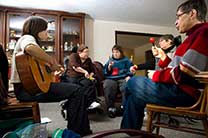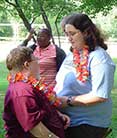Once you and your child have found housemates or decided to develop a home on your own, a legal structure is the next step.
The type of structure will depend on a number of issues, regulated by the state government. Your group may decide to become a trust, corporation, association, or partnership based on what is best for the residents and the area in which you live.
Always consult with an attorney before making any legal decisions.Benefits of a Legal Structure
- Provides a foundation for making decisions
- Simplifies the process of entering into contracts by allowing several parents to act as a single legal entity
- Minimizes your risk of liability for debts and obligations
- Protects the home’s property or assets from the financial liability of one person in a group
- Allows the home to survive beyond the founding families
- Provides possible tax advantages
Keep In Mind…
When deciding which legal structure to use, keep the following in mind:
- The cost and work to set up and maintain the legal structure
- Possible tax advantages
- The resulting stability of the residents in the home
Tips for Establishing a Legal Structure
- Hire a Neutral Attorney: Although you or another family may already have your own attorney, engage a separate attorney when working as a group. This attorney will not work for any single family, but rather represent everyone.
- Designate an Attorney Contact: A designated person should serve as the contact with the attorney. This person must communicate the questions and concerns of the group to the attorney and vice versa.
- Get a Head Start: Before meeting with the attorney, you and the other families should reach agreement on these questions:
- How will the group handle finances?
- Under what circumstances would a person be asked to leave the group?
- How will departing members of the group be replaced?
- How will disputes be resolved?













